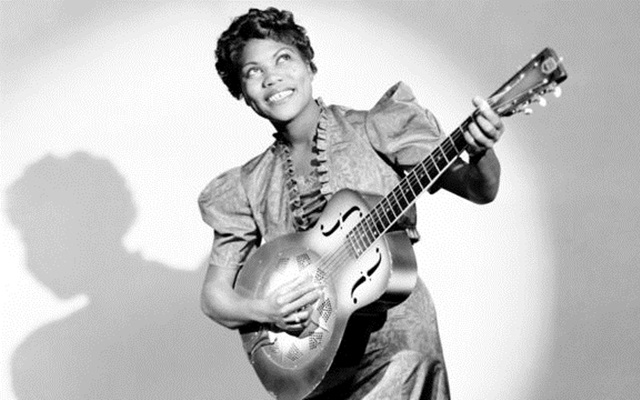Godmother of Rock n Roll: Sister Rosetta Tharpe
UNIYFPAD:Past A rainy day on a disused railway platform outside Manchester is not the sort of place you expect to see one of the most influential performers in rock ‘n’ roll history strutting their stuff.
You might not think that the artist in question would be a 49-year-old African-American gospel singer from Arkansas either.
This charming documentary of Sister Rosetta Tharpe is full of surprises, however.
The footage of the glamorously dressed Tharpe wielding her guitar at Chorlton-cum-Hardy station comes from a Granada TV folk, blues and gospel special in 1964.
It opens and closes the remarkable story of the greatest performer you never saw. One who inspired both churchgoers and rock ‘n’ roll superstars like Elvis Presley and Chuck Berry.
Sandwiched in between these scenes is an expertly driven narrative, lovingly delivered by her friends and colleagues.
Tharpe started her career singing gospel songs in her local church, although this was about as traditional as it got during her eventful life.
She grew up to become gospel’s first superstar in the 1930’s, causing controversy within her religious roots along the way.
Many of the hymns she performed in church were expressions of suffering, yet Tharpe also sang about pleasing your man in front of white, up-market audiences at New York’s Cotton Club.
Friends suggest this may have been more about the strict contract she had with bandleader Lucky Millinder, rather than any personal choice.
Either way Tharpe managed to carve out a successful career through her groundbreaking mix of gospel and showbiz.
The black and white film clips used throughout are fascinating, offering a taste of the sights and sounds of 1930’s and 40’s America.
Footage of Tharpe playing her guitar like a rock star, accompanied by a floor-length robed gospel choir is mesmerising. It also cleverly highlights the contradiction she presented.
While a huge hit with audiences, Tharpe was no angel offstage and the emotion of her surviving friends’ regrets at some of the decisions she made radiates through the camera.
Tharpe was unlucky in love and developed a habit of marrying men who took advantage of her. In a life full of ups and downs though, her devoted mother Katie Bell was the one constant.
The last known film of Tharpe performing was recorded two years after her mother’s death and the pain is noticeably still raw, etched across her melancholy delivery.
During the height of Tharpe’s career America was still a highly segregated society. She tried to break the mould by inviting white groups like The Jordanaires to tour with her.
They would repay the favour by sneaking food out to her from the many white only restaurants they encountered on the road.
Tharpe’s song about these unfair times Strange Things Happening Every Day poignantly turned out to be her biggest hit.
The documentary aims to recognise her wider legacy and the stories of young white men discovering African-American gospel music in 1950’s Mississippi are enlightening.
Tharpe’s unique playing style and energetic performances were clearly an inspiration to many, as her biographer Gayle Wald points out:
“We don’t think about the black woman behind the young white man. It’s not an image we are used to when we think about rock ‘n’ roll history.”
George Klein best describes the strength of her influence when talking about how his friend Elvis took the feeling Tharpe put into her music and saw it as the essence of rock ‘n’ roll.
Watching Tharpe onstage during the programme, it is easy to see how she moulded so many musicians. Countless artists, from the 1950’s right up to the present day, have imitated her style.
There is a little bit of Sister Rosetta in most of the guitar heroes popularised over the years.
By the end of the documentary, you want to share the story of this strong, convention-defying woman with as many people as you can.
It is important to ensure that Tharpe gets the recognition she deserves and fittingly the programme ends on a significant note.
In 2008, the Governor of Pennsylvania declared that 11th January would now be known as Sister Rosetta Tharpe Day. Spread the word.
Godmother of Rock ‘n’ Roll: Sister Rosetta Tharpe will be repeated on the BBC HD channel on Sunday 23rd January 2011 at 1.20 am. It is also available on BBC’s iplayer until Monday 24th January 2011 at the following link:
http://www.bbc.co.uk/iplayer/episode/b00xf8k7/The_Godmother_of_Rock_and_Roll_Sister_Rosetta_Tharpe/
[insert-html-here 24]

